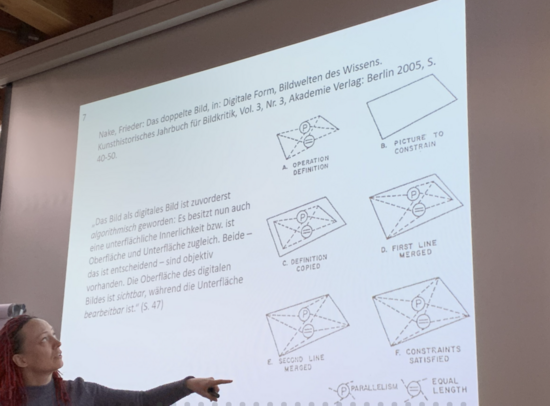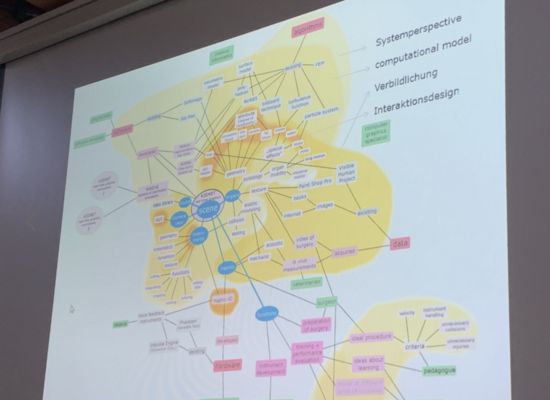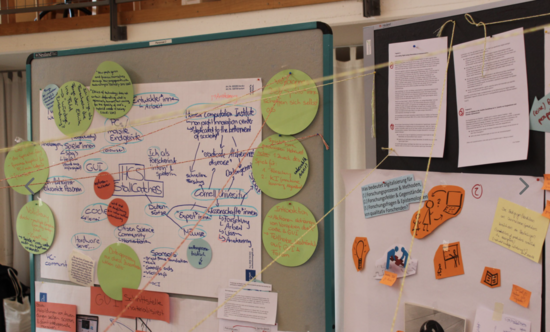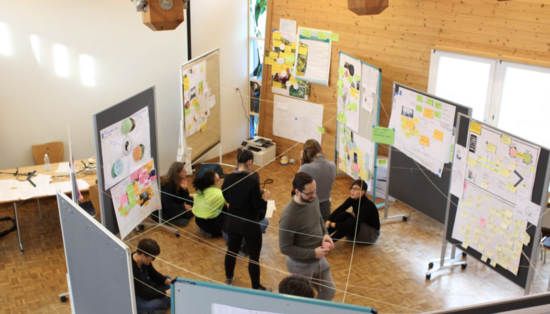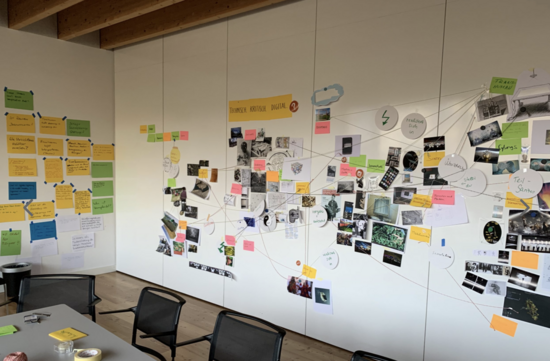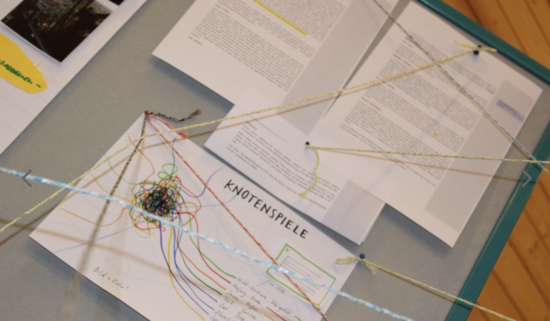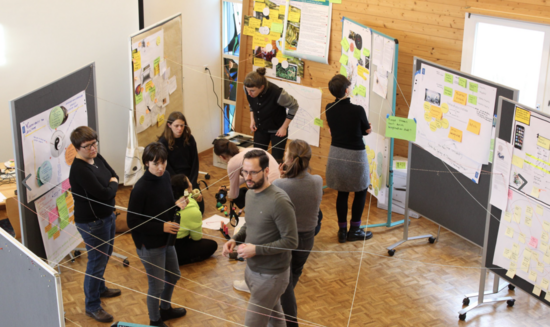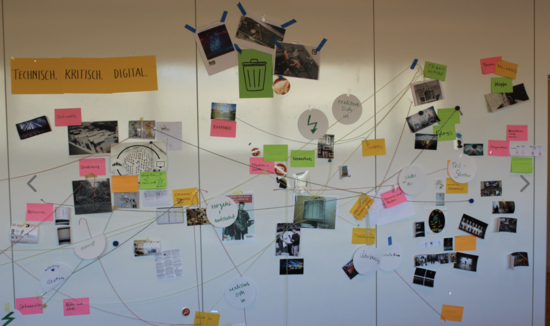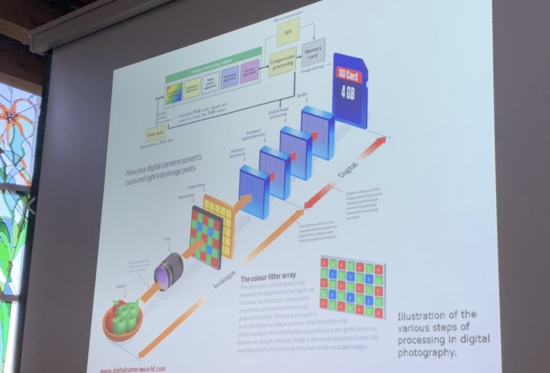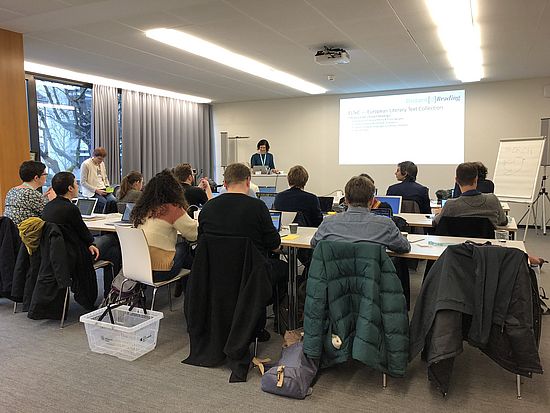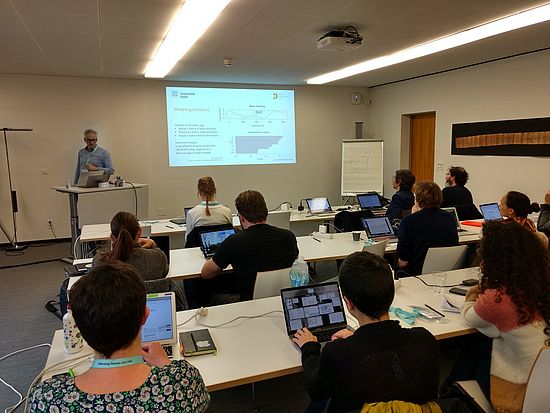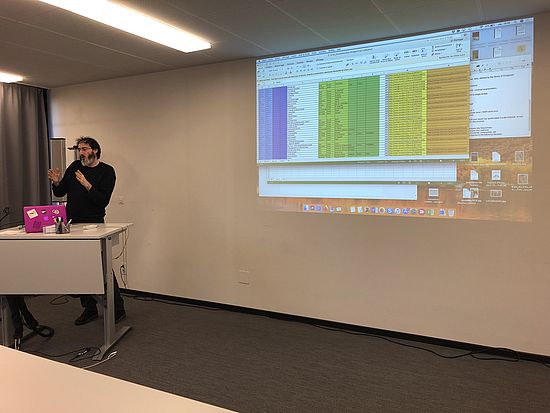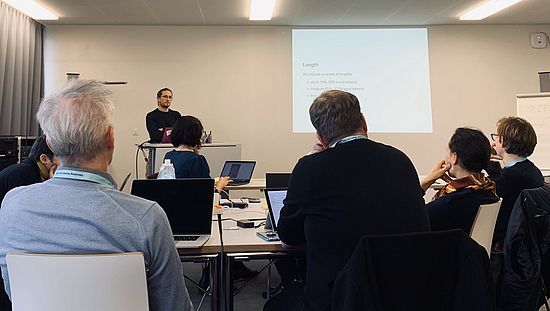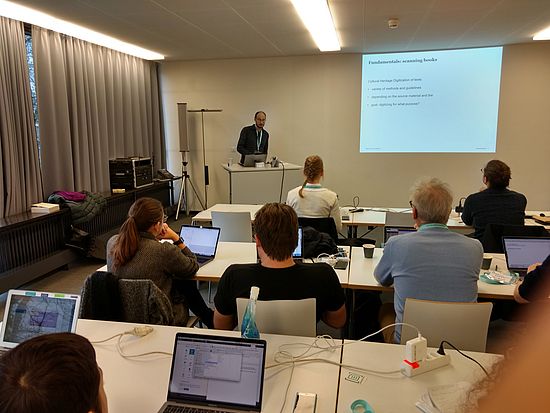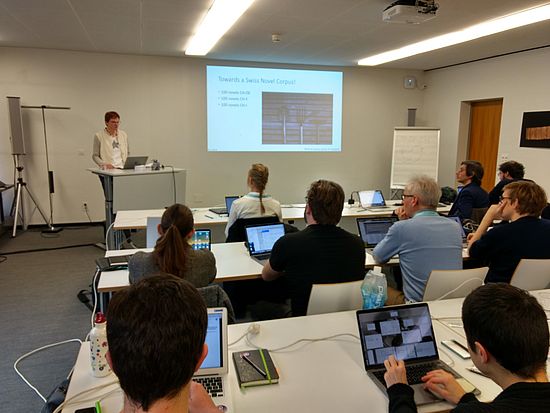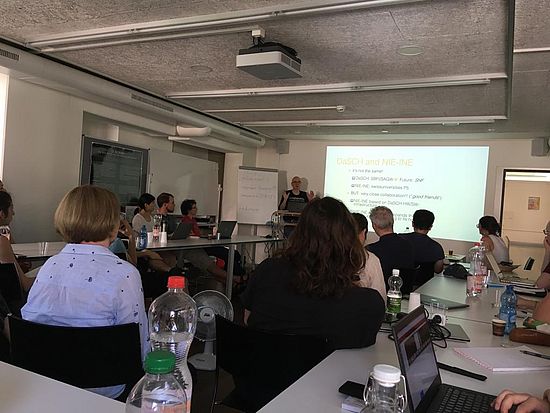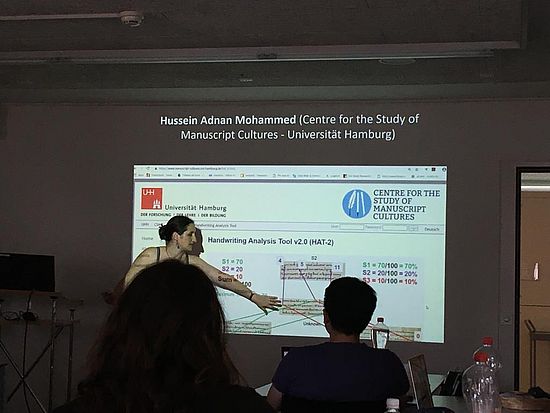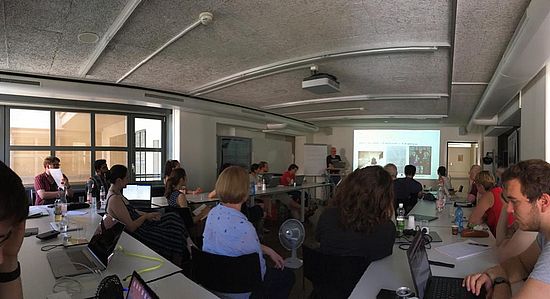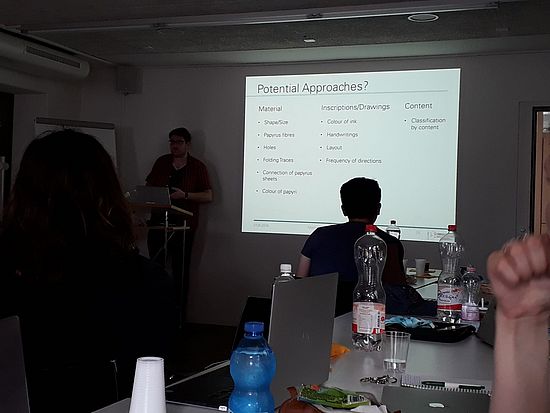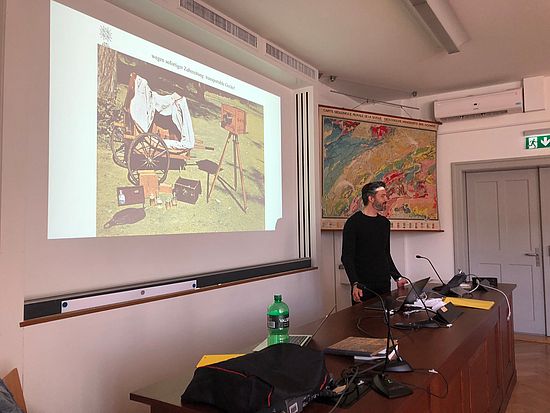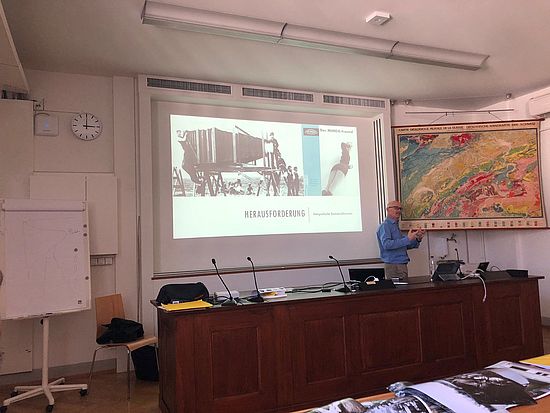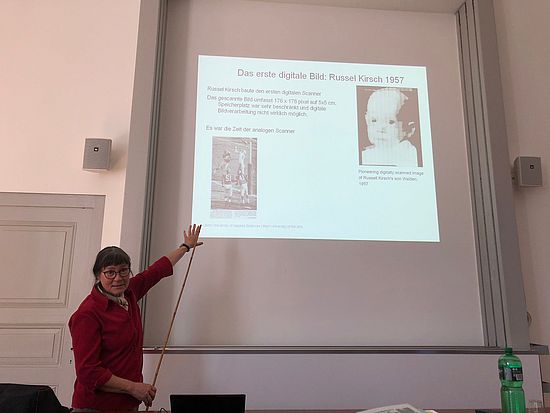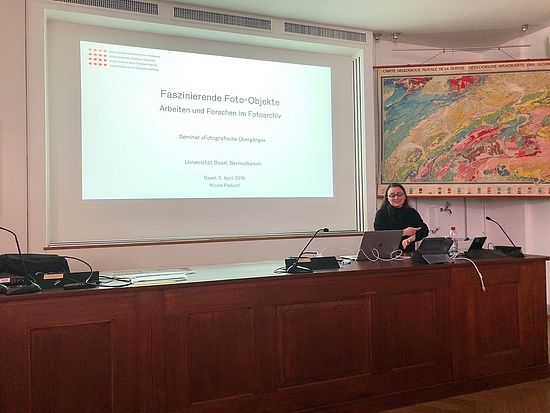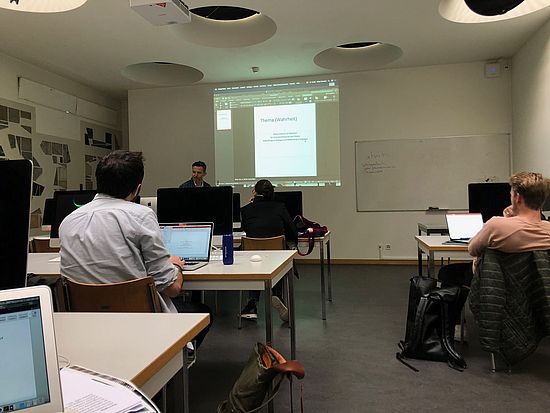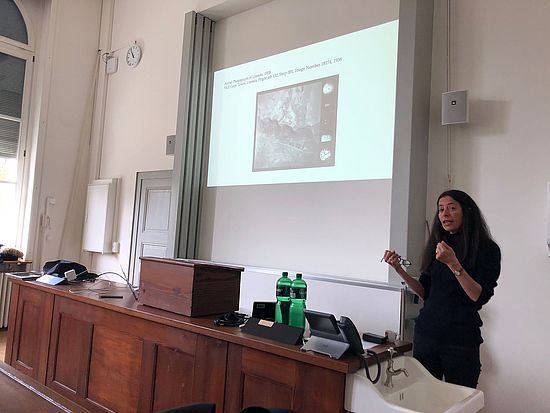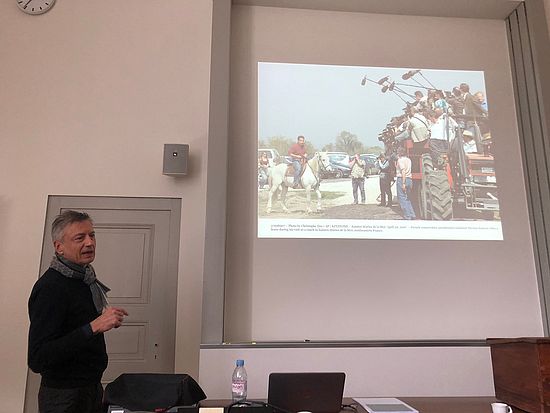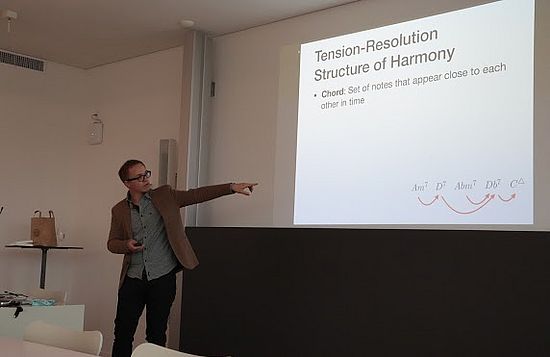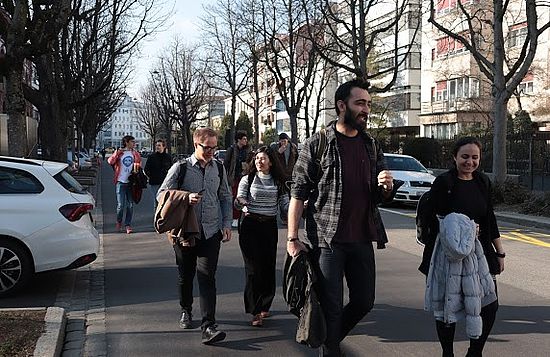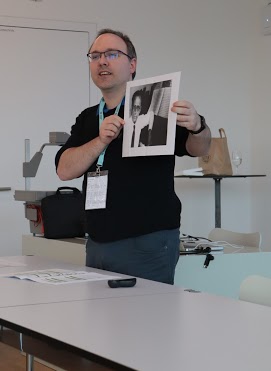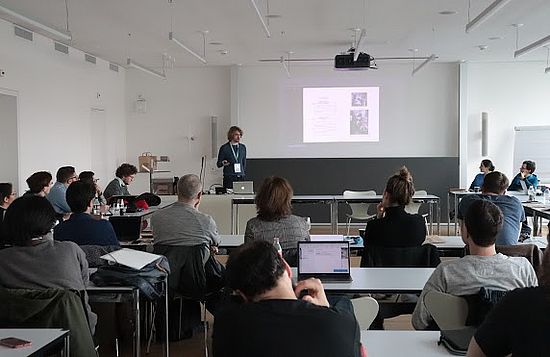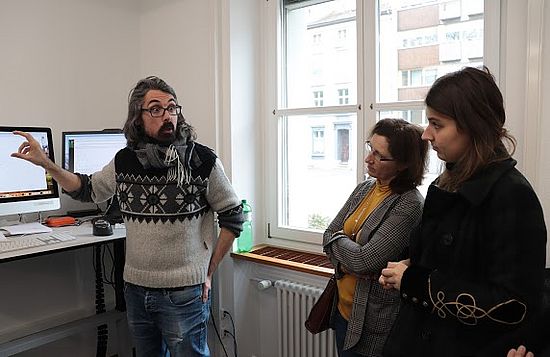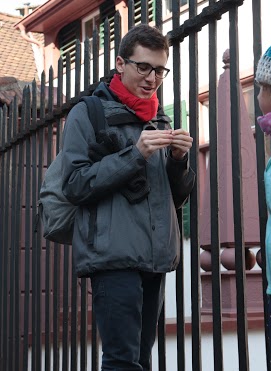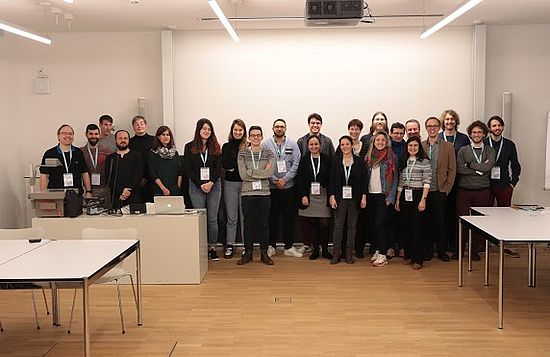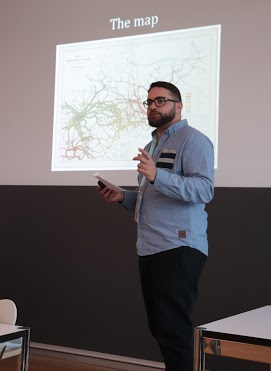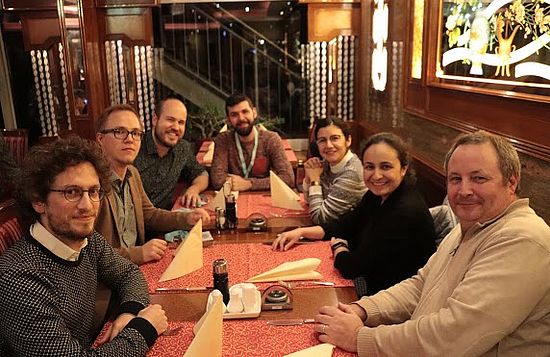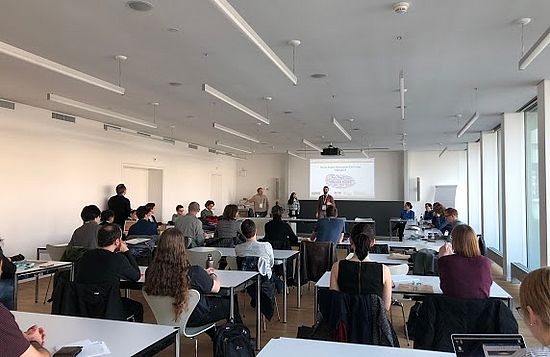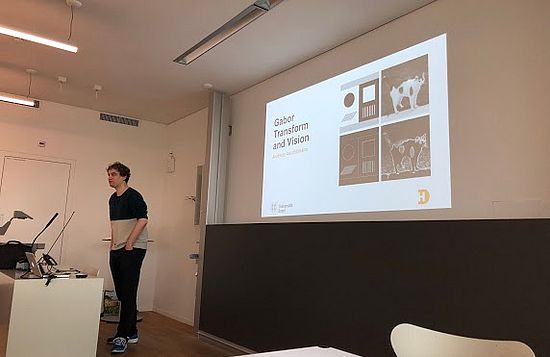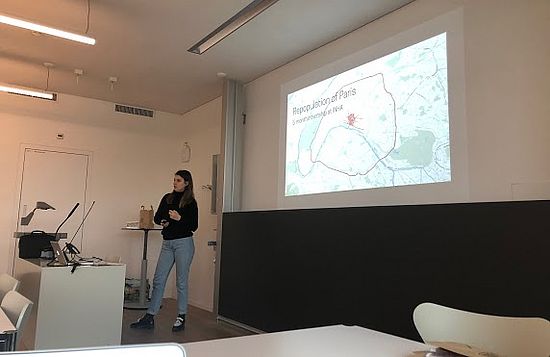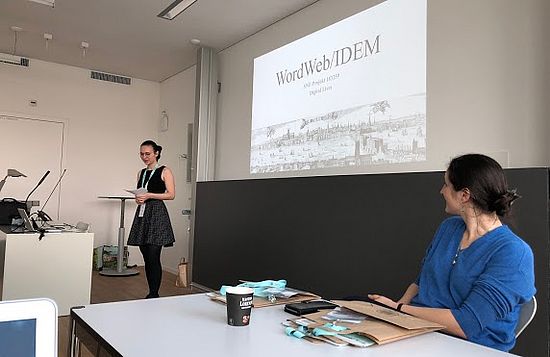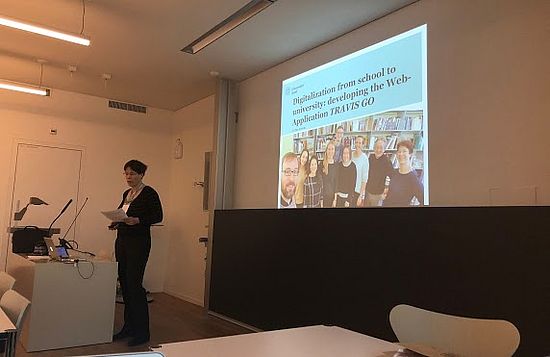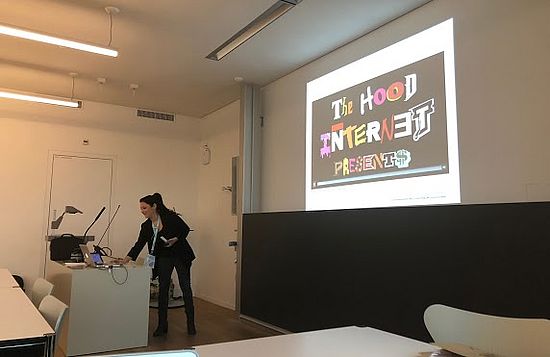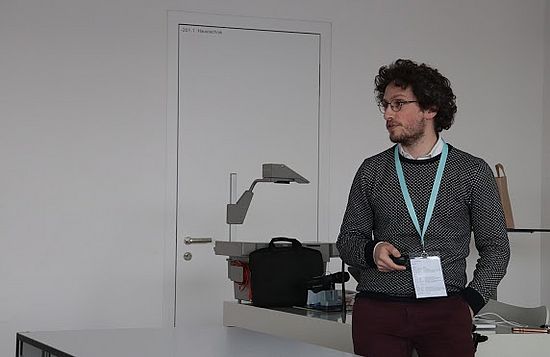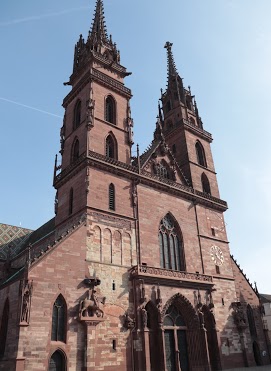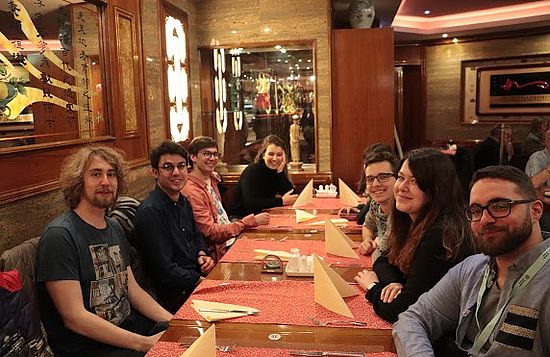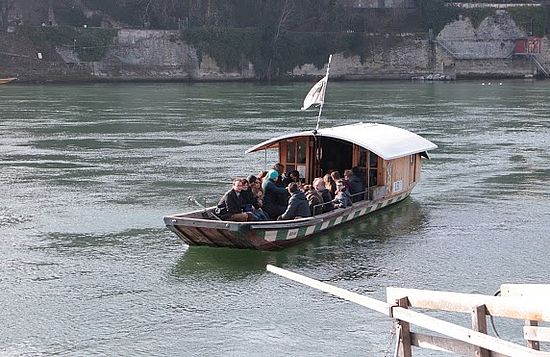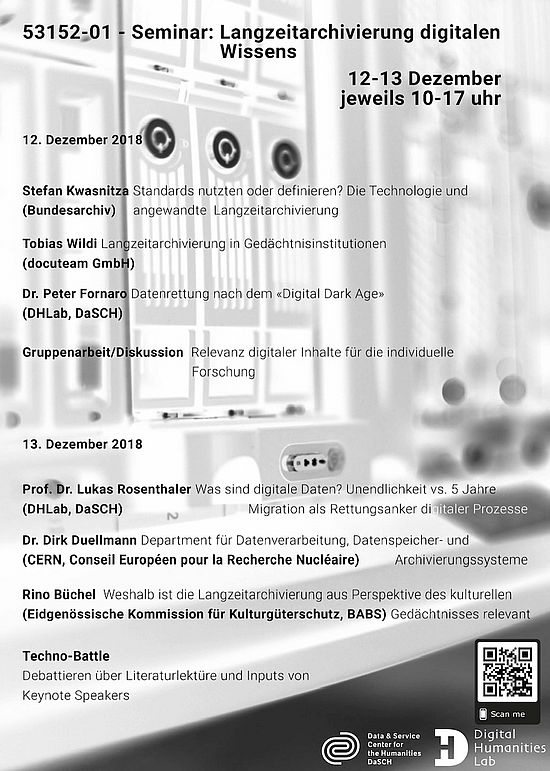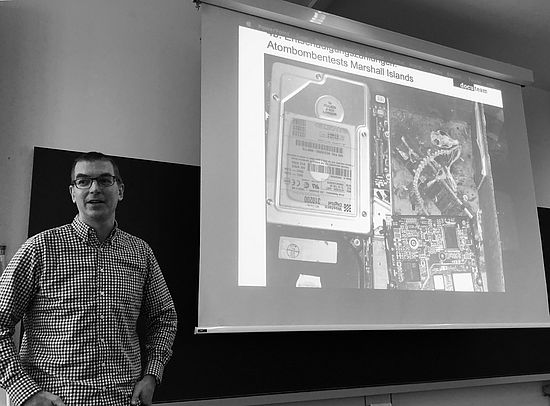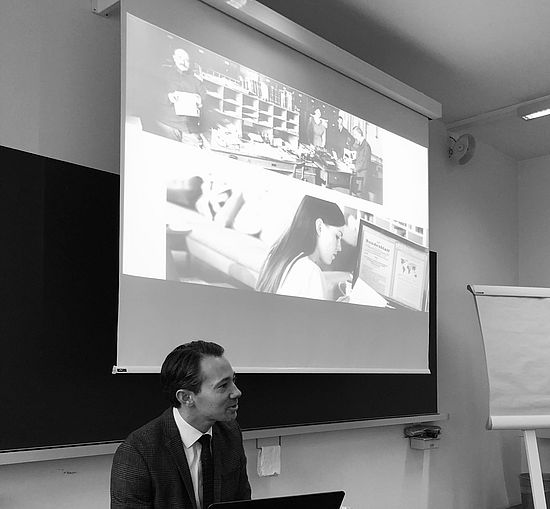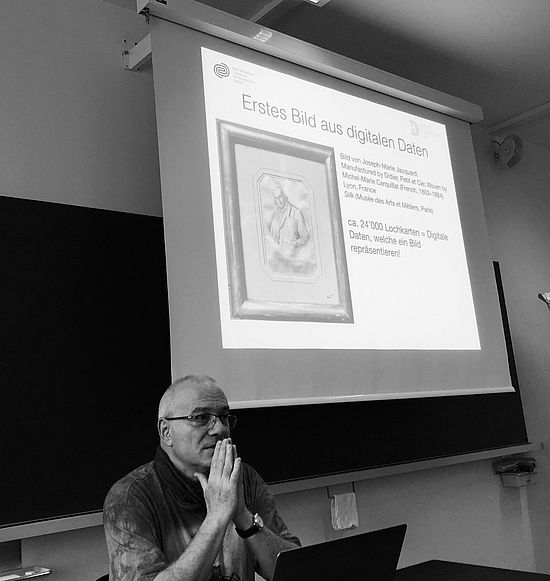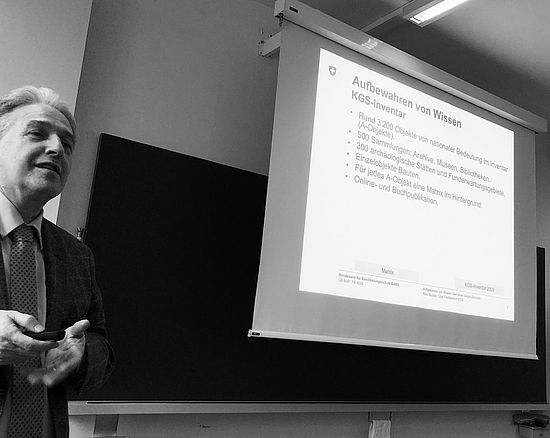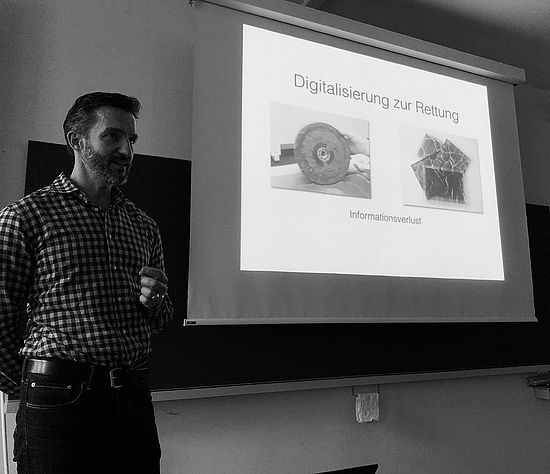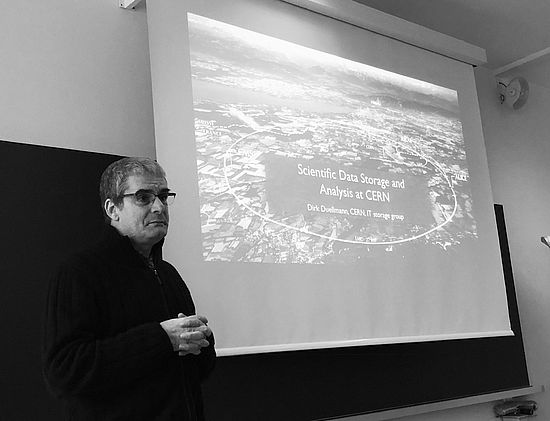NEWS
REPORTS & IMPRESSIONS
DH CH Launch Event: Digital Visual Media and Metadata (June 07-09, 2021)
Interdisciplinary Digital Humanities Research Workshop. The combination of image and text is essential to provide and exchange information in the digital domain. Researchers from different image-based research fields include different approaches to the subject of digital visual media and metadata.Metadata and semantic information are crucial for most of such operations with data. Enriching images with words and words with images is more important than ever.
This can be demonstrated for example by the research on cultural heritage, as important sources of great importance for our social and cultural identity. The change towards digital methods and tools is essential in this context in several ways since the form of capturing technology as well as the visualization of content changed greatly with the advent of the digital. Consequently, we will visit important roman cultural heritage institutions.
http://www.dh-ch.ch
Winter School Technisch.Kritisch.Digital. Interdisziplinäre Explorationen, January 2020
Eine Kooperation des Digital Humanities Lab, der Graduiertenschule G3S und dem SNF Digital Lives Projekt «Verhandeln, verdaten, verschalten» des Seminars für Kulturwissenschaft und Europäische Ethnologie der Universität Basel im Seminarhotel Lihn in Filzbach am Walensee.
Aus der Perspektive verschiedener Disziplinen widmete sich dieser Event der Frage, welche Rolle der kritisch-analytische Blick der Geistes- und Sozialwissenschaften bei der Implementierung und dem Verstehen der Prozesse spielt, die mit digitalen Technologien verflochten sind. Der Begriff Digitalisierung wird gegenwärtig sehr unterschiedlich gebraucht. Einerseits wird damit ein Prozess beschrieben, der allgegenwärtig in Gang ist und vielerorts vertraute Denkgewohnheiten und Kategorisierungen irritiert oder umschreibt. Andererseits ist sie ein politisches und wirtschaftliches Zukunftsprojekt, das Versprechen der Moderne einlösen soll, in dem alles schneller, effizienter und von der Fehlerhaftigkeit menschlichen Handelns befreit, möglich werden soll.
Als Output der Veranstaltung entstand folgender blog: https://www.goingdigital.de/blog-2/
Doctoral Course: Distant Reading – Tools and Methods, December 2019
Distant Reading, ein Verfahren, das durch die Digitalisierung in den Geisteswissenschaften entstanden ist, hat sich als einer der produktivsten Ansätze für literarische Texte erwiesen. Karten, Grafiken und Bäume, so Moretti (2005) in seinem Buch „Graphs, Maps, Trees: Abstract Models for a Literary History“ ermöglichen die innovative Relektüre berühmter Werke ebenso die Beschäftigung mit in Vergessenheit geratenen Texten. Neue Muster werden sichtbar, Hypothesen können erstmals systematisch auf grösseren Korpora überprüft werden. Jedoch wird beim Distant Reading oftmals die wichtige Ebene der ursprünglichen Datenerfassung vernachlässigt: Woher kommen die Daten? Wie werden sie gewonnen? Welche Implikationen haben hier bestimmte Entscheidungen?
In diesem Kurs wird vorgeschlagen, zur entscheidenden Phase der Datenerfassung zurückzukehren, indem die Produktionskette detailliert beschrieben wird. Wir beginnen mit OCR (Optical Character Recognition), ein Verfahren, das einen Bilddatensatz in nutzbaren Text umwandelt, wobei Variationen in Druck, Orthographie sowie Materialität der Artefakte Herausforderungen darstellen. Die zweite – und entscheidende – Einheit ist die XML-TEI-Codierung, die die gewonnenen Textdaten in eine durchsuchbare Datenbank transformiert und mit weiteren Informationen, etwa zu AutorIn, Gattung und Publikationszeitraum, versieht. Als dritte Einheit wird die Analyse mit der Software R aufgezeigt, die es ermöglicht, Forschungsfragen zu testen, sowie Daten explorativ zu analysieren und zu visualisieren.
Dieser Kurs legt den Grundstein für ein erstes mehrsprachiges Schweizer Literaturkorpus (Französisch, Italienisch und Deutsch). Anhand dieses Korpus wird im Verlauf des Kurses das Verfahren des Distant Reading und seine Bedingungen auf allen Ebenen diskutiert.
Der Kurs ist angebunden an ein gemeinsames Forschungsprojekt im Rahmen des europäischen Projekts Distant Reading for European Literary History https://www.distant-reading.net/
Doctoral Day: Computerizing Handwritings, July 2019
The doctoral Day “Computerizing Handwritings: Current Approaches on Ancient Documents” held in Basel on June 27th 2019 gathered around 30 scholars and students. During the day, ten speakers from Switzerland, France, the Nederland and Germany could present their ongoing research on historical document analysis and successfully set the foundations for future collaborations.
Forschungsseminar: Photographic Transition / Fotografische Übergänge, April 2019
The transition from analog pictures to digital pictures is very complex and these two categories intertwine with each other very closely. There is no exact borderline between all these development of technology. A lot of scientist have invested their time and effort into making pictures as convenient as we know it today. One of the well-known engineer would be Steven Sasson, who invented the digital camera under the name Kodak. However, Kodak was well-known for their camera films back then. Shortly after Kodak has actually presented the very first digital camera, a lot of other big companies like Sony, Nokia, Canon and Fuji would jump into the market as well, leaving Kodak with their famous camera films behind. Kodak failed to survive in the new market because people would always see Kodak as a camera films company even though Kodak was always keeping up technologically. Kodak failed to share their innovation of digital cameras with their audience.
Nowadays taking pictures can be seen very well on screens unlike back the all the pictures would be on paper. Printing pictures are not as common anymore as in the last century. The digitalization has a huge influence on us in many aspects and a lot research has brought us to where we are today.
In this seminar a lot about analog and digital photography was discussed and analyzed. It showed the big spectrum about the past and the present which gives a bigger understanding for the complex transition from analog to digital photography.
https://vorlesungsverzeichnis.unibas.ch/de/semester-planung?id=238603
Swiss DH Exchange, February 2019
The Swiss Digital Humanities Exchange was on fire #DHX2019
It all started with a tour of the DHLab Basel @Bernoullianum, a building that used to house the former Basel Observatory. Insights were given about on-going projects such as Bernoulli-Euler Online (presented by Tobias Schweizer) and Knora/Salsah (presented by Flavie Laurens & André Kilchenmann), as well as new ones coming in the future.
After these earlier visits, the Friday afternoon was organized in three sessions of “firing talks” with intermediate breaks (more).
The second day was dedicated to cultural and social activities and exchange. During a digital city tour a hidden side of Basel, full of surprises, was discovered. The event concluded with a visit of the HeK museum. The artistic projects that were shown in the exhibition (Pax Award winners of 2018) explored the social and technical issues of the digital era through different senses.
All participants agreed that this exchange must be continued at all costs. Hopefully you will soon hear about this group again which should already face planning a #DHX2020!
Want to be part of #DHX2020? Do not hesitate to contact us.
Long-Term Archiving of Digital Knowledge, December 2018
Long-term archiving or long-term access is a major topic after the digital turn in the humanities, as many funding agencies such as the Swiss National Science Foundation (SNSF) and the European Commission (for Horizon 2020 and ERC grant applications) are now requiring that a data management plan be in place in order to receive research funding. This new imperative raises many questions in the scientific community. In this event expectations and contributions in the field of data management and archiving were discussed. To better understand the contours of data management by emphasizing the necessary link between strategy and practice.
We had so many great experts like: Stefan Kwasnitza (Bundesarchiv), Tobias Wildi (docuteam GmbH), Peter Fornaro and Lukas Rosenthaler (DaSCH), Dirk Duellmann (CERN) and Rino Büchel (Eidgenössische Kommission für Kulturgüterschutz).
DH CH Launch Event: Digital Visual Media and Metadata (June 07-09, 2021)
Interdisciplinary Digital Humanities Research Workshop. The combination of image and text is essential to provide and exchange information in the digital domain. Researchers from different image-based research fields include different approaches to the subject of digital visual media and metadata.Metadata and semantic information are crucial for most of such operations with data. Enriching images with words and words with images is more important than ever.
This can be demonstrated for example by the research on cultural heritage, as important sources of great importance for our social and cultural identity. The change towards digital methods and tools is essential in this context in several ways since the form of capturing technology as well as the visualization of content changed greatly with the advent of the digital. Consequently, we will visit important roman cultural heritage institutions.
http://www.dh-ch.ch
Winter School Technisch.Kritisch.Digital. Interdisziplinäre Explorationen, January 2020
Eine Kooperation des Digital Humanities Lab, der Graduiertenschule G3S und dem SNF Digital Lives Projekt «Verhandeln, verdaten, verschalten» des Seminars für Kulturwissenschaft und Europäische Ethnologie der Universität Basel im Seminarhotel Lihn in Filzbach am Walensee.
Aus der Perspektive verschiedener Disziplinen widmete sich dieser Event der Frage, welche Rolle der kritisch-analytische Blick der Geistes- und Sozialwissenschaften bei der Implementierung und dem Verstehen der Prozesse spielt, die mit digitalen Technologien verflochten sind. Der Begriff Digitalisierung wird gegenwärtig sehr unterschiedlich gebraucht. Einerseits wird damit ein Prozess beschrieben, der allgegenwärtig in Gang ist und vielerorts vertraute Denkgewohnheiten und Kategorisierungen irritiert oder umschreibt. Andererseits ist sie ein politisches und wirtschaftliches Zukunftsprojekt, das Versprechen der Moderne einlösen soll, in dem alles schneller, effizienter und von der Fehlerhaftigkeit menschlichen Handelns befreit, möglich werden soll.
Als Output der Veranstaltung entstand folgender blog: https://www.goingdigital.de/blog-2/
Doctoral Course: Distant Reading – Tools and Methods, December 2019
Distant Reading, ein Verfahren, das durch die Digitalisierung in den Geisteswissenschaften entstanden ist, hat sich als einer der produktivsten Ansätze für literarische Texte erwiesen. Karten, Grafiken und Bäume, so Moretti (2005) in seinem Buch „Graphs, Maps, Trees: Abstract Models for a Literary History“ ermöglichen die innovative Relektüre berühmter Werke ebenso die Beschäftigung mit in Vergessenheit geratenen Texten. Neue Muster werden sichtbar, Hypothesen können erstmals systematisch auf grösseren Korpora überprüft werden. Jedoch wird beim Distant Reading oftmals die wichtige Ebene der ursprünglichen Datenerfassung vernachlässigt: Woher kommen die Daten? Wie werden sie gewonnen? Welche Implikationen haben hier bestimmte Entscheidungen?
In diesem Kurs wird vorgeschlagen, zur entscheidenden Phase der Datenerfassung zurückzukehren, indem die Produktionskette detailliert beschrieben wird. Wir beginnen mit OCR (Optical Character Recognition), ein Verfahren, das einen Bilddatensatz in nutzbaren Text umwandelt, wobei Variationen in Druck, Orthographie sowie Materialität der Artefakte Herausforderungen darstellen. Die zweite – und entscheidende – Einheit ist die XML-TEI-Codierung, die die gewonnenen Textdaten in eine durchsuchbare Datenbank transformiert und mit weiteren Informationen, etwa zu AutorIn, Gattung und Publikationszeitraum, versieht. Als dritte Einheit wird die Analyse mit der Software R aufgezeigt, die es ermöglicht, Forschungsfragen zu testen, sowie Daten explorativ zu analysieren und zu visualisieren.
Dieser Kurs legt den Grundstein für ein erstes mehrsprachiges Schweizer Literaturkorpus (Französisch, Italienisch und Deutsch). Anhand dieses Korpus wird im Verlauf des Kurses das Verfahren des Distant Reading und seine Bedingungen auf allen Ebenen diskutiert.
Der Kurs ist angebunden an ein gemeinsames Forschungsprojekt im Rahmen des europäischen Projekts Distant Reading for European Literary History https://www.distant-reading.net/
Doctoral Day: Computerizing Handwritings, July 2019
The doctoral Day “Computerizing Handwritings: Current Approaches on Ancient Documents” held in Basel on June 27th 2019 gathered around 30 scholars and students. During the day, ten speakers from Switzerland, France, the Nederland and Germany could present their ongoing research on historical document analysis and successfully set the foundations for future collaborations.
Forschungsseminar: Photographic Transition / Fotografische Übergänge, April 2019
The transition from analog pictures to digital pictures is very complex and these two categories intertwine with each other very closely. There is no exact borderline between all these development of technology. A lot of scientist have invested their time and effort into making pictures as convenient as we know it today. One of the well-known engineer would be Steven Sasson, who invented the digital camera under the name Kodak. However, Kodak was well-known for their camera films back then. Shortly after Kodak has actually presented the very first digital camera, a lot of other big companies like Sony, Nokia, Canon and Fuji would jump into the market as well, leaving Kodak with their famous camera films behind. Kodak failed to survive in the new market because people would always see Kodak as a camera films company even though Kodak was always keeping up technologically. Kodak failed to share their innovation of digital cameras with their audience.
Nowadays taking pictures can be seen very well on screens unlike back the all the pictures would be on paper. Printing pictures are not as common anymore as in the last century. The digitalization has a huge influence on us in many aspects and a lot research has brought us to where we are today.
In this seminar a lot about analog and digital photography was discussed and analyzed. It showed the big spectrum about the past and the present which gives a bigger understanding for the complex transition from analog to digital photography.
https://vorlesungsverzeichnis.unibas.ch/de/semester-planung?id=238603
Swiss DH Exchange, February 2019
The Swiss Digital Humanities Exchange was on fire #DHX2019
It all started with a tour of the DHLab Basel @Bernoullianum, a building that used to house the former Basel Observatory. Insights were given about on-going projects such as Bernoulli-Euler Online (presented by Tobias Schweizer) and Knora/Salsah (presented by Flavie Laurens & André Kilchenmann), as well as new ones coming in the future.
After these earlier visits, the Friday afternoon was organized in three sessions of “firing talks” with intermediate breaks (more).
The second day was dedicated to cultural and social activities and exchange. During a digital city tour a hidden side of Basel, full of surprises, was discovered. The event concluded with a visit of the HeK museum. The artistic projects that were shown in the exhibition (Pax Award winners of 2018) explored the social and technical issues of the digital era through different senses.
All participants agreed that this exchange must be continued at all costs. Hopefully you will soon hear about this group again which should already face planning a #DHX2020!
Want to be part of #DHX2020? Do not hesitate to contact us.
Long-Term Archiving of Digital Knowledge, December 2018
Long-term archiving or long-term access is a major topic after the digital turn in the humanities, as many funding agencies such as the Swiss National Science Foundation (SNSF) and the European Commission (for Horizon 2020 and ERC grant applications) are now requiring that a data management plan be in place in order to receive research funding. This new imperative raises many questions in the scientific community. In this event expectations and contributions in the field of data management and archiving were discussed. To better understand the contours of data management by emphasizing the necessary link between strategy and practice.
We had so many great experts like: Stefan Kwasnitza (Bundesarchiv), Tobias Wildi (docuteam GmbH), Peter Fornaro and Lukas Rosenthaler (DaSCH), Dirk Duellmann (CERN) and Rino Büchel (Eidgenössische Kommission für Kulturgüterschutz).
Quick Links

